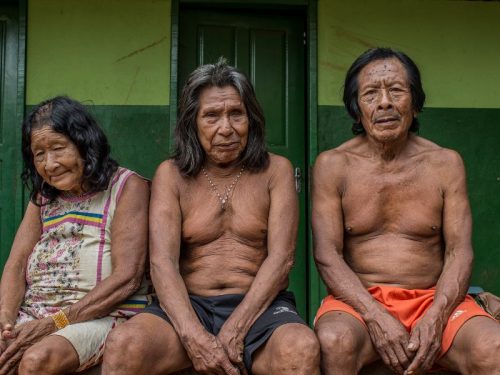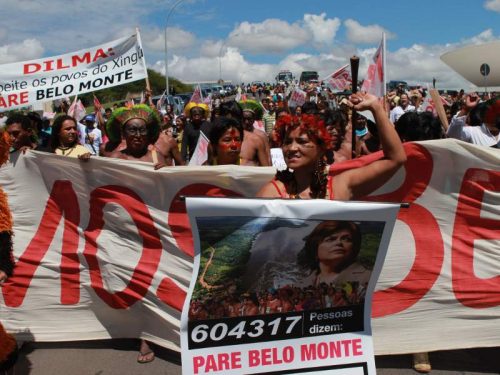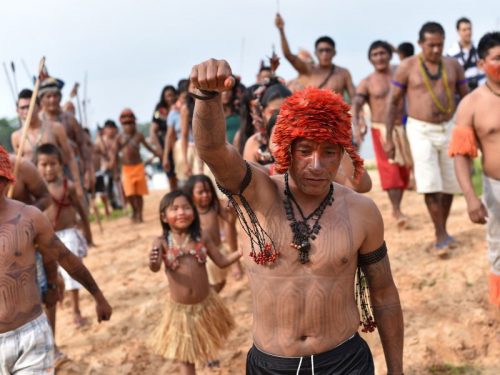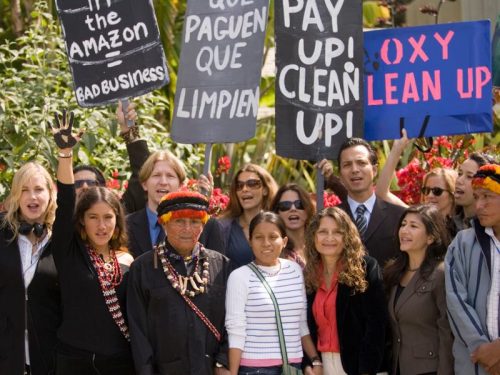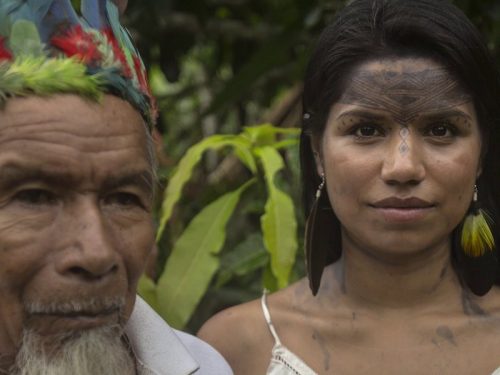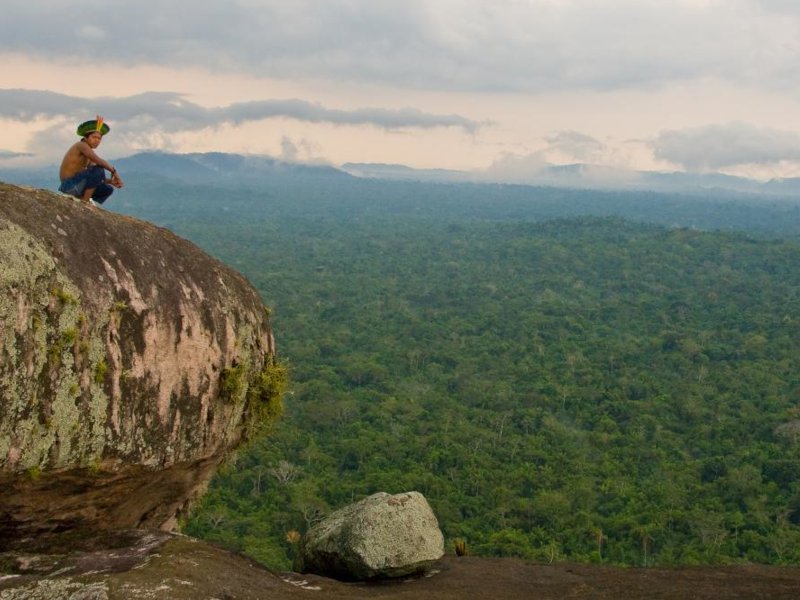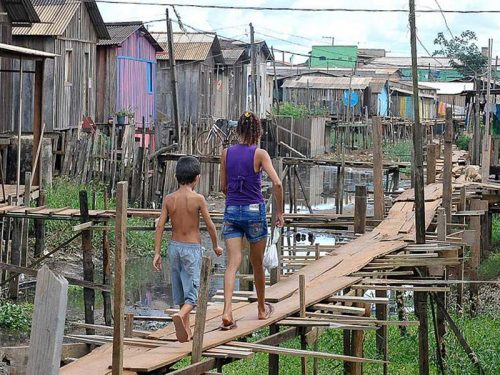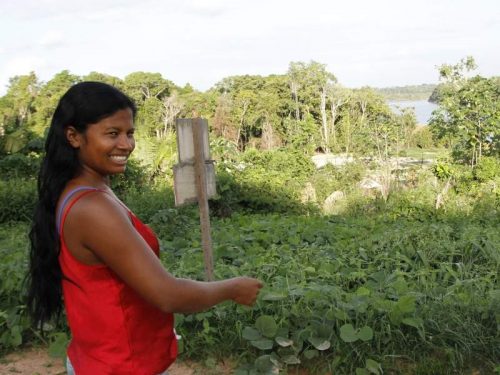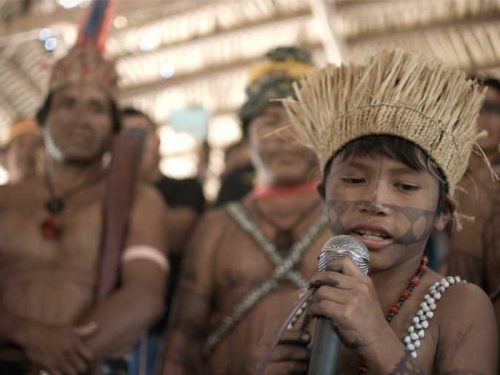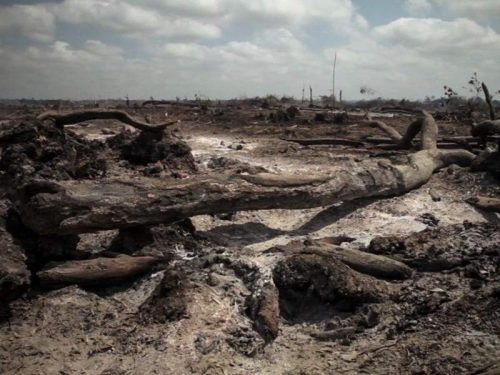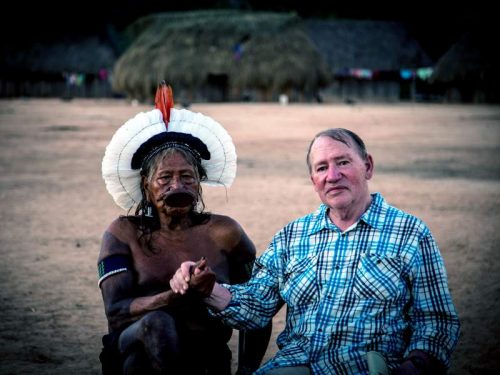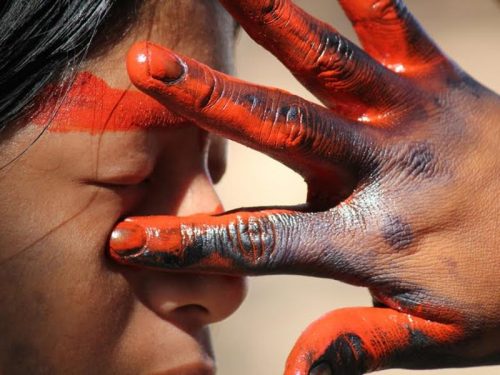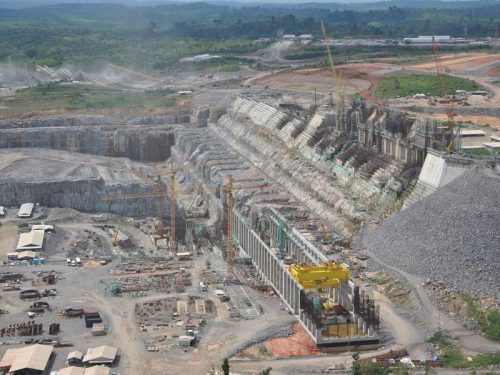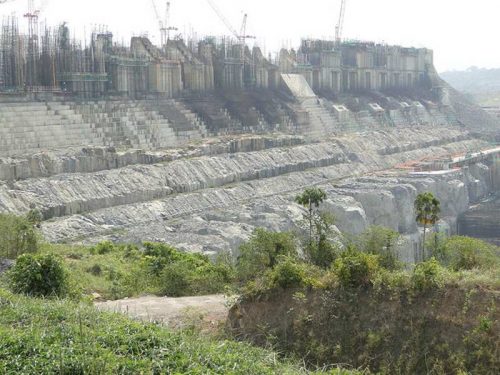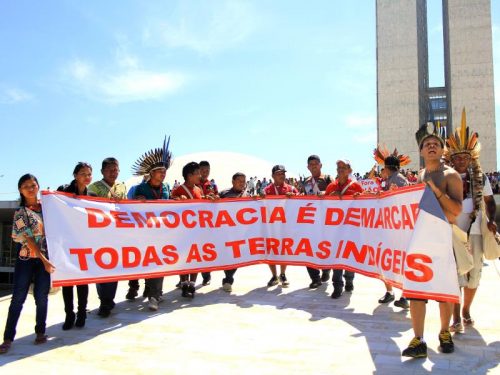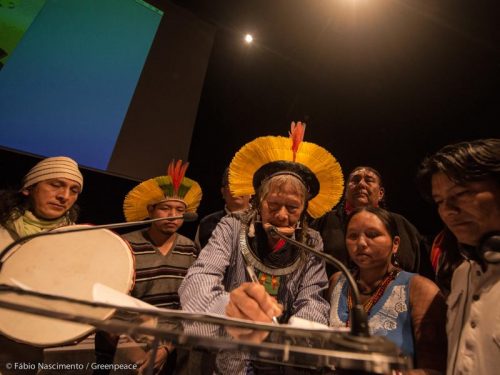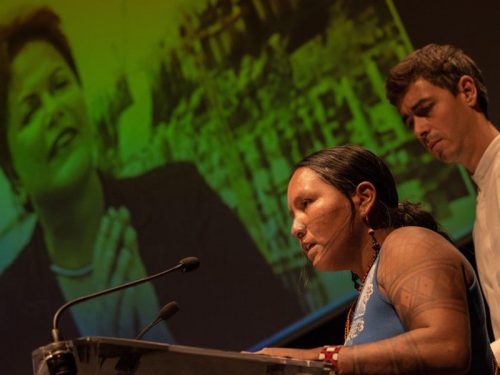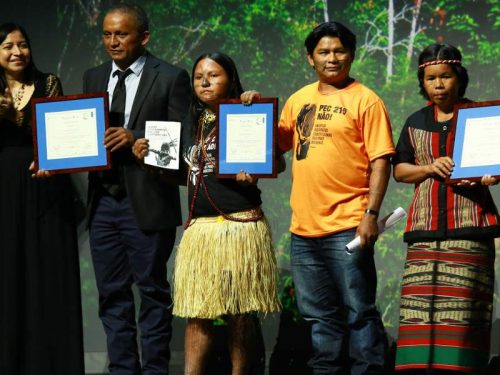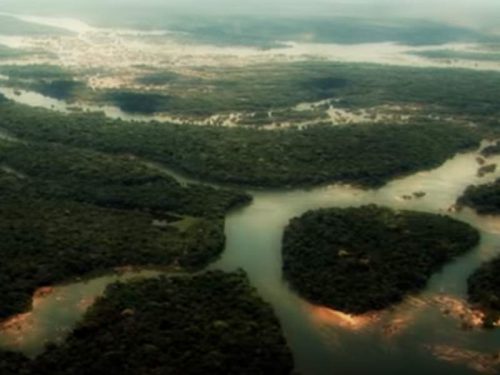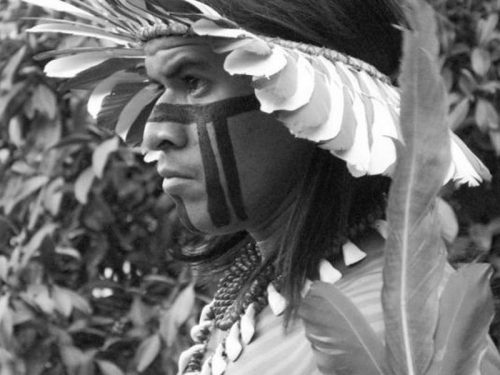It does not come as a surprise to those who have followed the Belo Monte saga over the last six years that the mega-dam has been allowed to begin operating this year without first complying with most of its legally mandated socio-environmental conditions.
Hydroelectric Dams
Belo Monte a Symbol of Obscene Destruction and Corruption in Brazil
Amazon Watch and our allies have long argued that the Belo Monte mega-dam project made no sense in terms of energy production or economics – especially taking into account the enormous environmental and social destruction it was certain to cause. The dam was constructed despite the steadfast resistance of the affected Kayapo and riverine peoples...
Honoring River Defenders: Brazil’s Munduruku People
In light of last week's damning evidence directly implicating Brazilian President Dilma Rousseff and her predecessor Lula da Silva in a kickback scheme, a driving force behind Brazil's dam-building boom has been laid bare: corruption.
Happy 20th Birthday, Amazon Watch!
Twenty years ago today, our founder Atossa Soltani stood face to face with Fernando Cardoso, then the president of Brazil. Atossa knew then that while indigenous peoples represent only four percent of the world's population, they are the guardians and stewards of 80 percent of the world's biodiversity. That's why she founded Amazon Watch on March...
Amazon Watch: Protecting the Amazon by Advancing Indigenous Rights
Amazon Watch works to protect the rainforest by advancing the rights of indigenous peoples. We work closely with indigenous leaders to help amplify the calls to keep the oil in the ground and stop mega-dams in the Amazon to avoid climate chaos. Defending indigenous rights, territories, living forests and flowing rivers are demonstrably effective...
Amazon Watch is building on more than 25 years of radical and effective solidarity with Indigenous peoples across the Amazon Basin.
Report from the Amazon: Altamira, a City Transformed by the Belo Monte Dam
The scale of this change, mind-boggling as it is, is not unusual in this part of the world. Over the last half century, Brazil’s economic frontier reached the region, bringing a huge influx of workers – waves of loggers, gold-panners, cattlemen, miners, road and dam builders.
Which Chinese Corporations Have Their Eyes on the Amazon?
The implosion of Brazilian businesses with the Lava Jato corruption operation, the devaluing of the Real currency, and the rise in credit rates in Brazil have created an opportunity for Chinese businesses to establish greater participation in the country. Taking advantage of this situation, the China Three Gorges enterprise is preparing to make an...
In Santarém More Than 500 People Debate Dams, but the Brazilian Government Doesn’t Send a Representative
So many people attended the hearing that in the beginning one group that couldn't manage to enter the public auditorium provoked a bit of a ruckus in response to the attempt to cancel or change the location of the hearing.
The High Price of Belo Monte and Modernization in the Life of the Muratu Indigenous Community
The most drastic change in Bel's life was the obliteration of her ancestral identity and the imposition of a new identity when she was compelled to transform from a fisherwoman into a farmer.
Munduruku Building New Alliances To Fight Tapajós Basin Dams in Amazon
"They want to end the history of the Munduruku, but we won't let them," chief Juarez Saw declared. After every pronouncement, his listeners responded with a resounding shout: "Sawé!" – both a salutation and a war cry.
The World’s Forests Will Collapse If We Don’t Learn To Say "No"
An alarming new study has shown that the world's forests are not only disappearing rapidly, but that areas of "core forest" – remote interior areas critical for disturbance-sensitive wildlife and ecological processes – are vanishing even faster.
Belo Monte: Burning Legal Timber Stokes the Fires of Brazil’s Illegal Lumber Market
The burning of trees and animal deaths is only the first stage of a vicious cycle that marks the relationship between Belo Monte and the surrounding forest. Authorized to devastate thousands of hectares, the plant should use the timber for its own purpose or donate it for external use. The entry of large volumes of timber into the local market...
Brazil Court Revokes Injunction Blocking Belo Monte Dam Operation
The ministry said a decision from the federal court in Brasilia lifted the earlier order blocking the beginning of power generation at Belo Monte, which had been planned for the coming weeks.
Honoring the Legacy of Terry Turner
Terry's incisive ethnographic work with the Kayapo people, and his longstanding advocacy on behalf of their culture, forests, and rivers, earned him unique respect and admiration from Kayapo leadership, who called him 'Wakampu'.
Ecuador to Sign Contracts for Two Controversial Amazonian Oil Blocks
Quito, Ecuador – The Ecuadorian government has announced imminent plans to sign contracts for two controversial Amazonian oil blocks which are facing adamant opposition from local indigenous people residing within the roughly half-a-million acre concessions and beyond.
Belo Monte Dam Operations Delayed by Brazil Court Ruling on Indigenous People
"This case sets an important precedent for the defence of indigenous rights in the Amazon at a time when the government is set to repeat the Belo Monte disaster by building dozens of dams on the Tapajós River."
Brazil Court Suspends Amazon Hydrodam Licence on Native Demands
A Brazilian court has suspended the operating licence for the Belo Monte hydroelectric dam, one of the world's largest, just weeks before its owner, Norte Energia, planned to start electricity generation.
Hydropower Dams Threaten One-Third of the World’s Freshwater Fish
Brazil's massive Belo Monte dam, which is due to be completed this year, "may set a record for biodiversity loss" owing to its siting at a location with an exceptional number of endemic species.
IACHR Opens Case Against Brazil for Human Rights Violations Related to Belo Monte Dam
Washington, DC – As the first reservoirs of the Belo Monte Dam are being filled, the Brazilian government is coming under fire from international organizations. On December 21, the Inter-American Commission on Human Rights opened a case against Brazil, which was challenged by affected communities represented by the Interamerican Association...
In Brazil, 2016 Announces New Conflicts and Challenges for the Amazon
2015 could only be defined as a bad year for Brazil. Economic meltdown, political crisis, social adversity, and environmental destruction defined the last twelve months. Yet rather than striking out in new directions as 2015 drew to a close, the Brazilian government was doubled down on its failing socio-economic model, ushering in a new wave of...
The Human Side of the Climate Change Equation
While government officials inside COP21 conference rooms just outside Paris were reviewing the cost-benefit analyses of cutting down on emissions or debating the numerical semantics of the warming of the earth, the human side of climate change and environmental destruction took center stage just a few kilometers south at the Maison des Metallos on...
What the Paris Climate Agreement Means for Indigenous Rights and Hydroelectric Dams
The final agreement from the Paris climate talks has been the subject of much controversy regarding the language in the document pertaining to indigenous rights. Any semblance of a legally binding measure pertaining to these rights was omitted from the final agreement that was signed by the governments of 190 countries. The agreement concluded a...
"Where Our Government Kills, We Cultivate Life"
At the closure of this year's critical COP21 summit in Paris, the most inspirational stories do not stem from official negotiations. They emanate from the heroic efforts of global indigenous movements, bringing a message of resilience and defiance from the front lines of climate change.
Communities from Latin America Among Those Honoured with Equator Prize 2015
"Our struggle is large and dangerous, but we know we shall win. I've been to Belo Monte so I know what these dams represent: if they are built on the Tapajós they will flood our lands, and destroy our fish and hunting. We've come to put an end to this madness," Munduruku Chief Suberanino Saw told Amazon Watch in 2104.
Brazilian Indigenous Movement Receives Prominent UN Environmental Prize at COP21 in Paris
Paris, France – Indigenous leaders Maria Leusa Kaba Munduruku and Rozeninho Saw Munduruku will receive today the prestigious UNDP Equator Prize at an awards ceremony at COP 21, in recognition of the Munduruku people's courageous efforts to protect their territories in the Brazilian Amazon from threats posed by planned hydroelectric dams, as well...
Global Coalition Says Mega-dams Should Be Kept Out of Climate Initiatives
A coalition of more than three hundred civil society organisations from 53 countries has launched a manifesto calling on government leaders and financiers at the Paris climate talks to keep large hydropower projects out of climate initiatives.
Why a Paris Climate Treaty Needs To Protect the Amazon
As negotiators butt heads in Paris over the fine print of a new United Nations climate treaty, one issue they will need to address urgently is the fate of the Amazon.
10 Reasons Why Climate Initiatives Should Not Include Large Hydropower Projects
Support from climate initiatives is one of the reasons why more than 3,700 hydropower dams are currently under construction and in the pipeline. Yet large hydropower projects are a false solution to climate change.
Brazil Authorizes Operation of the Belo Monte Dam, Disregarding the Rights of Affected Communities
Altamira, Brazil – The Brazilian Institute of Environment and Renewable Natural Resources (IBAMA) today authorized the Belo Monte Dam’s operating license, which allows the dam's reservoirs to be filled.


